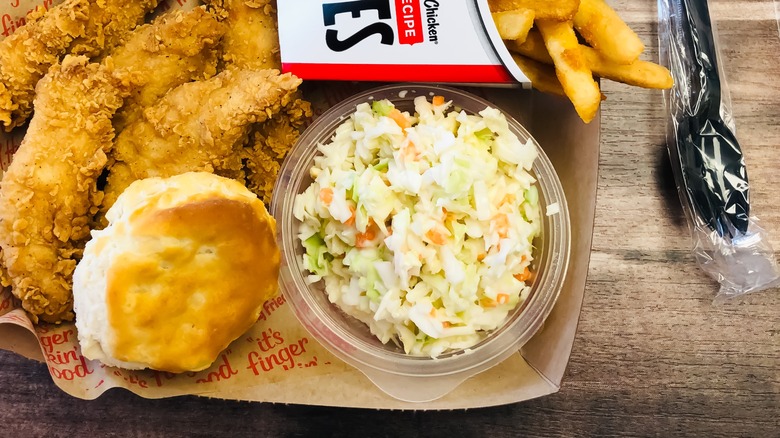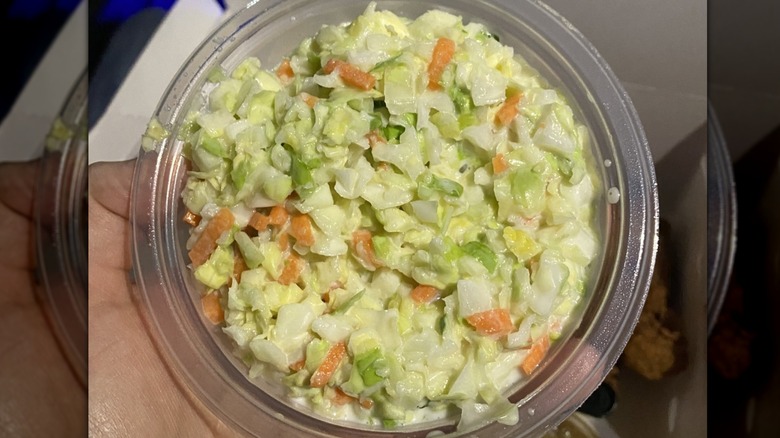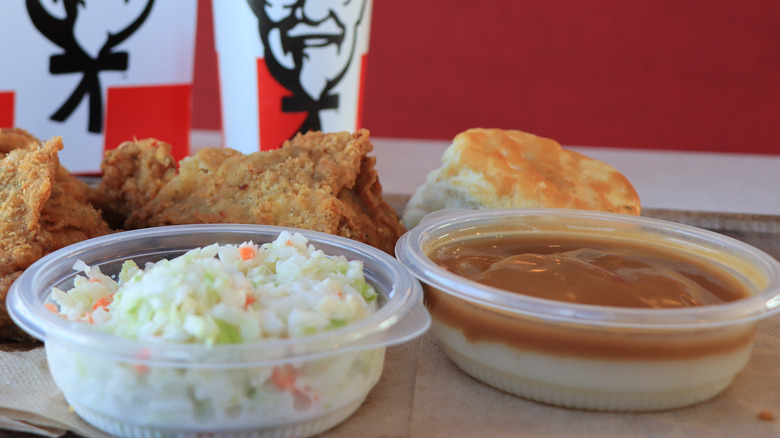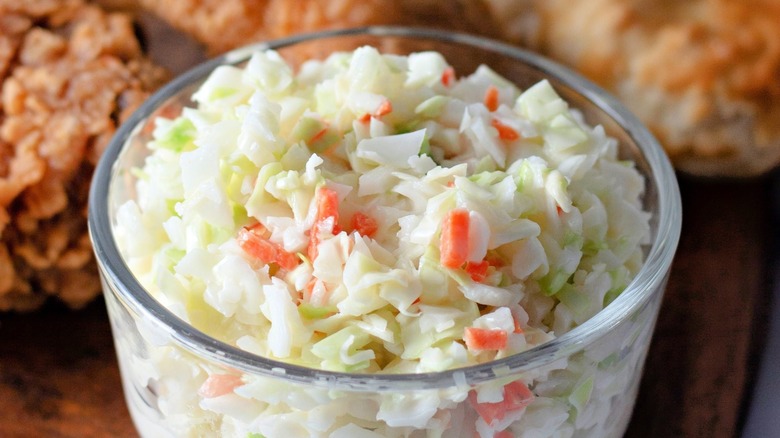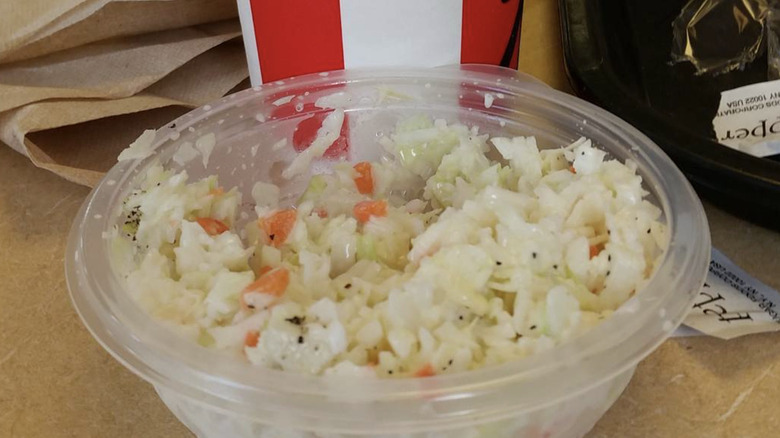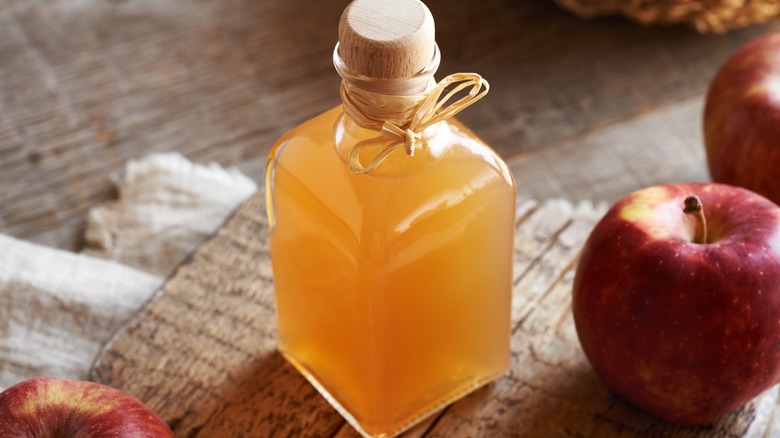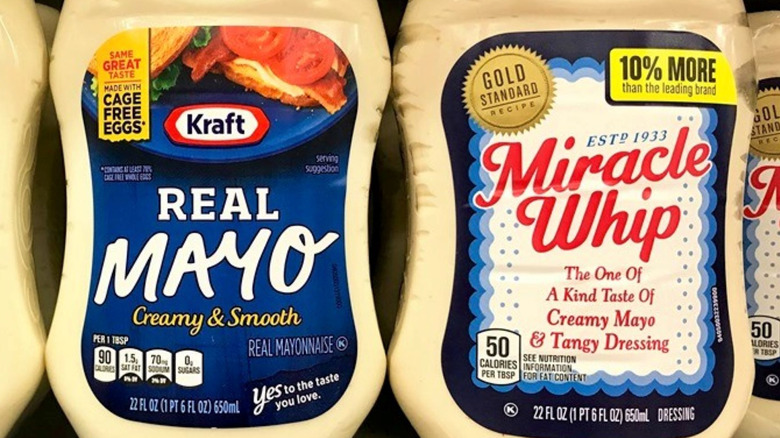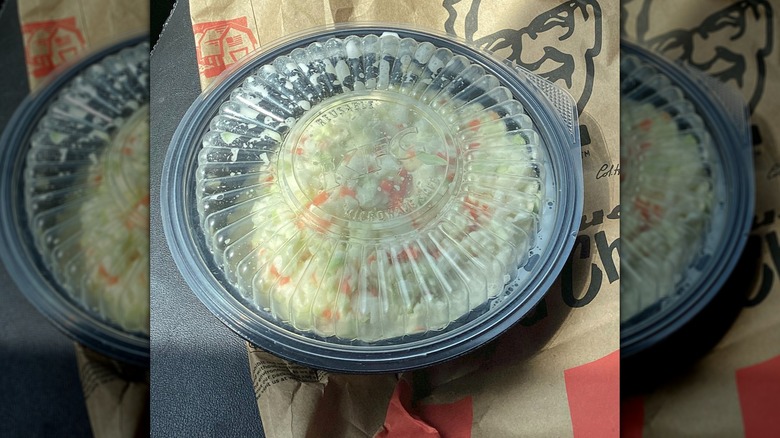What Makes KFC's Coleslaw So Delicious
While most quick-service and casual restaurants focused on fried chicken and Southern comfort foods offer other fast food sides besides potatoes, it's an assumed consensus, and almost objectively true notion, that KFC has the best coleslaw. Some of America's greatest fried chicken is served up daily at thousands of KFC outlets around the world, but it's just not a true meal or a true interaction with the legendary Colonel Sanders without a heaping helping or little plastic cup of coleslaw. As historical and popular as KFC's fried chicken is, the chain is almost as well known for its coleslaw, a second to none concoction made up of little more than cabbage, carrots, and a sweet and also savory sauce.
Coleslaw lovingly made at home, or purchased from other restaurants never quite tastes like or feels like the stuff dished out at KFC. That's because the chain takes special care and uses very particular ingredients, prepared through a precise process, to get that winning, one of a kind finished product. Here's exactly why KFC's coleslaw is just so undeniably good.
The veggies are perfectly prepped
The texture and overall mouthfeel of KFC's coleslaw are as important and notable to the dish as are the taste. Coleslaw can easily turn gloopy or experience separation, and that could very well come from how the sauced salad is traditionally made with shredded vegetables. The cabbage primarily, but other veggie ingredients like carrots, and onions, populate most coleslaws in the form of long, thinly cut strips. KFC does it differently — all of the vegetables in its coleslaw are finely chopped until they're minuscule squares and rectangles.
Cutting the ingredients into the smallest possible form provides more surface area that can accept and absorb the thick and creamy dressing that turns a pile of chopped vegetables into coleslaw. This method allows the sauce to stick to the ingredients, and so the whole thing tends to stay mixed and blended for much longer, thus letting the dressing sink into the solid pieces, making them soft and flavorful.
It's perfectly cold when that's needed most
Most widely available fast food sides are hot — french fries, onion rings, and the like. This is particularly true at KFC, which re-creates in a low-priced, takeaway situation classic American homestyle dinners. The chain serves what historically and favorably pairs well with fried chicken, such as mashed potatoes and gravy, corn on the cob, macaroni and cheese, biscuits, and coleslaw. Only the coleslaw is not dispensed to customers in a warm or piping hot manner. Acting as a counterpart adds to its appeal — coleslaw is a functional side, for it presents as a cooling balm to consume in between bites of fried chicken bursting with hot juices and positively molten macaroni or potatoes.
The coldness of the coleslaw also plays off of other foods on the KFC menu because it's so different from everything else. The KFC biscuits can tend to be dry, but the moisture of the almost-mushy coleslaw precludes that from being an issue while the cooling effect can also treat spiciness. Some of those KFC menu items, like the hot wings, are rather fiery, and the coleslaw takes the edge off of the heat.
It's visually appealing
Eating involves so many of the senses, not just taste, and we're often most drawn to the foods that look like they may have a lot of flavors or pack a lot of nutrition. Studies indicate that recognizing foods as tasty with sight is an evolutionary advantage, with the ability to see in color a necessary function developed by early humans to notice nutritious and energy-providing wild fruits and vegetables. This in turn led to a visual sense of hunger, or the association of the sight of food with wanting or feeling the need to eat it.
This plays out in how we crave and want to consume foods today. The KFC coleslaw, for example, is bright and colorful so as to be inviting — all those chopped vegetables that contain important nutrients call out to eaters with those green, white, and orange colors. Conversely, it's all the more noticeable when contrasted with other KFC menu items — all that fried chicken and the mashed potatoes and gravy come in shades of unexciting brown.
It's not too salty and just sweet enough
The quality of a ready to serve coleslaw hinges on the proper balance between the small handful of elements of which it's made. A well-made coleslaw should be savory, sweet, tangy, and salty — all of those but not too far into any single lane. The coleslaw recipe at KFC takes that into consideration, and it offers the precise blend of those taste categories.
A serving of KFC's coleslaw does pack an objectively high amount of salt — 180 milligrams of sodium in one plastic cup's worth, meaning there's about 8% of the FDA's daily recommended allowance in this one small side dish. But that's also little enough salt that the diner isn't consciously aware of how salty the coleslaw could be, because any overt saltiness gets canceled out by the sweetness. That same portion of coleslaw contains 10 grams of added sugar, or 20% of the FDA's daily advised amount. The saltiness and sweetness swirl around each other to create a flavor that's both things and something new as well, letting the tanginess and savoriness push through.
The secret is in the vinegar
KFC's coleslaw hits a lot of specific and readily identifiable tasting notes — the completed fast food side dish is sweet, salty, creamy, and savory, among other descriptors. A number of adjectives could be used to note another element that's hard to define, like zesty or tangy or popping. That signature zing isn't found in other restaurant coleslaws, and KFC's is so good because of this edginess, and it gets it from the inclusion of some bitter, acidic, complex vinegar.
According to actual KFC employees, the secret ingredient as it were in the chain's coleslaw is vinegar, specifically the kind made by letting sweet apple cider ferment. This is why KFC's coleslaw is so zesty, tangy, and packs a zing. The vinegar itself provides that spark on its own, as does the combination of the ingredient with all the other flavoring agents in the KFC coleslaw.
The dressing is tough to beat or replicate
The predominant ingredients in a coleslaw are cabbage and a dressing, and since cabbage doesn't pack a wallop of flavor on its own, the vegetable is a vehicle for the sauce. A coleslaw is only as good as its dressing, and KFC's is unlike any other fast food or pre-made supermarket coleslaw because of its unique dressing. Most coleslaws, whether prepared professionally or from a recipe, call for a mayonnaise-based dressing, and KFC's is no different, utilizing a smooth, creamy sauce of which mayo is the foundation. But KFC's coleslaw differentiates itself from and towers over all others because the dressing's base is made up of more just mayo, seasonings, and salt, but also the mayonnaise-adjacent condiment Miracle Whip.
Throwing a kink into the old Miracle Whip versus mayo debate, former KFC employees claim that the officially sanctioned coleslaw recipe uses a blend of mayonnaise and Miracle Whip. That adds a distinct tang as well as sweetness and some subtle other flavors, too, because Miracle Whip is made with a fair amount of garlic, paprika, and sugar.
It's well portioned
Beyond just the flavors, functionality, and texture, a key to the overarching greatness and consistency of the KFC coleslaw may be entirely psychological. KFC seems to know exactly how much coleslaw is enough for most of its customers. It's sold in two ways at the vast majority of KFC outlets — in a small, shallow plastic bowl intended to be part of a single individual's meal, or in a large tub to be split among as many as three other people. Either way, that one carefully portioned and perhaps small-seeming mound of wet, sweet, salty, sauce cabbage bits is the correct amount of coleslaw one can and should consume with a KFC meal along with chicken, bread, and perhaps another starchy side.
The taste of coleslaw is so unique that too much of it can be overpowering. KFC seems to be aware that too much of a good thing is bad in this case, because any more coleslaw than what's presented might be nauseating. Instead, customers are served just the right amount to counteract the heat of the other dishes and offer sweet and creamy tastes to balance out the meaty and oily flavors of the fried chicken.
